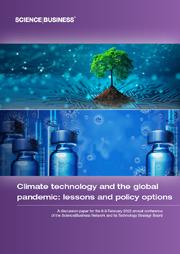A discussion paper for the 8-9 February 2022 annual conference of the Science|Business Network and its Technology Strategy Board
Get your free copy

Last year’s COP26 conference drew global attention to the science and technology that humanity will need in order to mitigate the climate crisis. New investment funds, scientific collaborations and technology policies are in train – for carbon removal, energy efficiency, renewable energy sources and more.
But how quickly can these innovations be adopted and diffused throughout the world? Will they stay in the hands of the richer nations and companies that devise them, or spread globally? Will governments encourage the sharing of knowledge openly, or will climate technology become a new flash point in the global competition for jobs, income, health and safety? This paper argues that we already have a test-bed for answering such questions: the global pandemic, and the ground-breaking science and technology it has stimulated.
The lessons so far aren’t encouraging: while the global scientific community strove to share data, it was at times constrained by government. And those governments reverted to a depressing old form: focus on the national problems first and worry about the rest of the world later. That approach will not work in a global climate crisis.
Here, we argue that there is, in fact, a wide range of options governments could consider when tackling this next global science and technology challenge, of climate. The key objectives: keep science open, keep innovation and technology trade flowing as freely as possible, learn from each others’ implementation successes, and find a way to get the developed world cooperating better in technology while assisting the developing world in building its own talent and production capacity.
As others have pointed out, there is no vaccine possible against climate change. But there are thousands of lessons, big and small, to apply from our messy pandemic experience.
With this discussion paper, Science|Business welcomes informed comment from around the world on the merits and demerits of the various technology-diffusion options we are offered. Our aim is to encourage broad, expert and open debate, so that humanity can find the right policy course for its own survival. The views expressed, an editorial statement of Science|Business, do not necessarily reflect the views of Science|Business Network members.
Contributors to this report:
- Luc Soete, Emeritus Professor and former Rector Magnificus, Maastricht University
- Maria da Graça Carvalho, Member, European Parliament
- Antoine Petit, Chairman & CEO, Centre National de la Recherche Scientifique
- Richard L. Hudson, Editor-in-Chief, Science|Business

 A unique international forum for public research organisations and companies to connect their external engagement with strategic interests around their R&D system.
A unique international forum for public research organisations and companies to connect their external engagement with strategic interests around their R&D system.